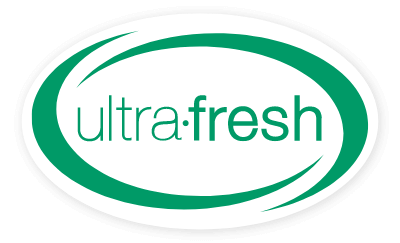What is an antimicrobial treatment?
An antimicrobial treatment is applied to a material during manufacturing to make it resistant to the growth of unwanted bacteria and fungi that can cause staining, odor and product degradation. Such treatments are applied to:
- Products that are exposed to severe environments such as outdoor gear and materials
- Consumer goods such as socks, cutting boards or bathtubs to control bacteria that can cause odors and staining
- Products to differentiate them from others on the market, such as phone cases, flooring, food storage containers, etc.
How does an Ultra-Fresh antimicrobial treatment work?
Ultra-Fresh antimicrobial treatments work at a cellular level to continually disrupt the growth and reproduction of microorganisms. The treatment attacks microbes, damaging the protein, cell membrane, DNA and internal systems of a microbe. Once infused into a product, Ultra-Fresh antimicrobial treatments will start to work as soon as bacteria, mold or mildew come into contact with the treated surface.
What is the difference between the terms antimicrobial, antibacterial and antifungal?
Antimicrobial is a general term that refers to an agent or treatment that has either antibacterial or antifungal properties or both.
Antibacterial specifically refers to an agent or treatment that prevents the growth of bacteria.
Antifungal specifically refers to an agent or treatment that prevents the growth of mold and mildew.
What types of products can I treat with Ultra-Fresh and Silpure?
Ultra-Fresh and Silpure antimicrobial treatments have been formulated for use in a diverse range of products. View some common antimicrobial applications.
How can I buy Ultra-Fresh or Silpure?
Ultra-Fresh and Silpure are sold to industrial users in more than 50 countries. For more information, please contact us.
What does an antimicrobial treatment cost?
The cost of using Ultra-Fresh and Silpure will vary depending on the type and level of application and the product used. Costs would typically be pennies per pound of treated material. Contact us for further information.
How is the antimicrobial treatment applied?
Our antimicrobial products are applied using standard equipment and normal manufacturing processes. For textiles this could be exhaust, pad (foulard), spraying, coating or foaming. In polymers it could be coating, extrusion, injection molding etc.
Will the antimicrobial treatment affect the characteristics of my product (i.e. colour fastness, crocking, yellowing, reaction time, cure time, stability etc.)?
Our antimicrobial products are formulated to have minimal effect on the other properties of a treated product. We do, however, recommend that laboratory or plant trials be run before going into full production.
Can the antimicrobial treatment be used along with other auxiliaries (i.e. fire-retardants, dyes, softeners, wicking agents etc.)?
Most Ultra-Fresh and Silpure treatments are non-ionic and are compatible with softeners and other auxiliaries. However, as there is variation in the types of auxiliaries that are available around the world, we do recommend running compatibility tests before going into production.
How long does the antimicrobial treatment last?
We work closely with manufacturers to ensure that the correct treatment, procedures and level of Ultra-Fresh or Silpure are applied so that it will last longer. Longevity depends on the treatment process and end-use material.
Can I use the Ultra-Fresh or Silpure brand name on my treated products?
Our Ultra-Fresh or Silpure brands are available to use once a Trademark License Agreement is in place. Contact us directly for more details.
How do Ultra-Fresh antimicrobial treatments differ from disinfectants?
Unlike disinfectants which provide a limited residual activity once the treated surface dries, integrated Ultra-Fresh antimicrobial treatments work to continuously inhibit the growth of bacteria and fungi throughout the entire life cycle of a product.
Are there any health or environmental concerns when using or selling Ultra-Fresh or Silpure?
Our antimicrobial products are registered with the U.S. EPA. Registration is granted by the EPA only after chemical, toxicological and environmental fate data has been reviewed. The EPA requires this information under its mandate to protect the U.S. public and the environment. SDS information is available to our customers upon request.
